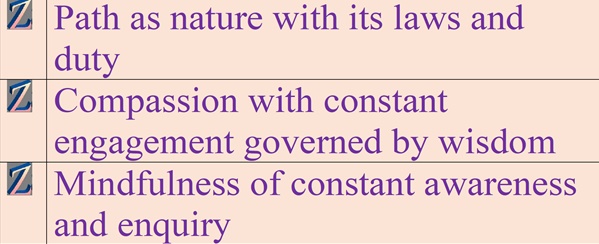13) Spiritual Bypassing or Stream-Entry?

This is the final impasse for the pathtivist companion. Pathtivism is focussed on daily life; in Buddhist terms living with the 5 dhamma comrades to reach atammayata, or in pathtivist terms integrating your fragments, detaching from and non-attaching to egos, and being authentic. But this chapter poses the question of enlightenment.
Buddhadasa talks of emancipation from the world in the handbook for mankind, and if Buddhadasa spoke of it then the Buddha spoke of it. This is what Buddhists speak of as stream-entry, and it is something I have no tangible experience of. For me following MwB is about following the path, it measures and concludes with how we follow our path in daily life. The purpose of the path is to live in harmony with Gaia, and live the best life possible; with certain provisos that is what Jeff Brown promotes in grounded spirituality.
But the question I can only pose is:-
Is there stream-entry?
My answer to that has got to be yes because the Buddha and Buddhadasa say so – even though that goes against the strength of the teaching of kalama sutta, that we only follow what we experience. Is there stream-entry for me? No – as yet? But if I am writing a meditation companion, I have to offer it as a possibility.
In truth I am loathe to offer this possibility because of the delusion and abuse of spiritual bypassing. To be fair to Teal she generalises about the problem of spiritual bypassing, but does suggest that there are people who have moved onto “different planes”. In Buddhist terms she has not excluded the possibility of stream-entry. For zandtao the emphasis on wisdom tradition increases the possibility of spiritual bypassing, and this will be discussed in zanshadtao in the Prajna portal.
In this powerful indictment, Clare Dubois does exclude the possibility; my practice at the moment agrees with her, the contents of the Companion completely supports her except for posing this question – is there stream-entry?
Now there is an institutional problem associated with spiritual bypassing; in Buddhism most of our teachers are monks. For monks themselves, the emphasis is not on daily life as they have renounced it. There is an anomaly as they are the teachers about applying Buddhism to our daily life yet they have renounced daily life and are probably seeking stream-entry. If this is what they are doing for themselves it must come across in their teaching. Their teaching curriculum would include stream-entry but the question is:-
Would it be appropriate to teach stream-entry to the lay?
This could be a big source of spiritual bypassing where lay people bypass sampajanna to focus on stream-entry. It is not that lay people don’t have the potential for stream-entry but in my view stream-entry is only likely to occur if you are 100%-dedicated to the path. Ostensibly renunciates are 100%-dedicated but lay are not likely to be because of requirements of daily life such as earning a living or caring for loved ones. Therefore lay people are unlikely to be ready for this aspect of the curriculum leading to spiritual bypassing.
In ch13 of the manual I talked about complete disenchantment. For pathtivism this was to try and show that in activism reward cannot be the motivation. It is our natural duty to accept complete engagement but to measure that engagement in terms of social success will only cause dukkha – attachment and disappointment. This complete disenchantment led me to conclude that political engagement as guided by the path is the wise solution, and why I advised in ch 14 only following the path as a fruitful approach. But here’s the rub, I do not know if your path must take you to stream-entry.
How do we know if it is appropriate to consider stream-entry for ourselves? I cannot answer that. I will give pointers only to sources. Buddhadasa spoke of emancipation from the world in the handbook for mankind. That is enough for me to question at the appropriate time, and of course if Buddhadasa is speaking of stream-entry it is because the Buddha spoke of it. When describing atammayata, Buddhadasa said this (this way as described in Ch12 - the Coolness of Atammayata):-
 [p3 here] [p3 here]
And maybe it is the case that Buddhadasa entered, I don’t know if he said that was true. I also don’t know if Thich Nhat Hanh spoke of stream-entry but with my limited knowledge in this world these are two people I would consider as possibilities.
Having posed the question I will say this; I cannot see how anyone can be entering the stream without having integrated their fragments, being 100%-dedicated to the path, and without attaining atammayata. To be that sure is difficult and there would have to be absolute certainty that there was no delusion. If that is the case this companion has nothing to offer you, and I apologise if I have wasted your time.
Follow your path, be 100%-dedicated to the path, be your true self, be authentic. Metta and good luck.
Next/Companion Contents/Previous

Note:- As of 11/4/20 I have sort of completed the companion - Ch14 on Faith has been added since then. The companion is the sort of work that could never be complete firstly as I learn more about each dhamma or characteristic, and secondly as students teach me more. But for a website of non-commercial writings this can serve as readable. Hope it helps. As a hindsight to this note part 2 of embodying love-wisdom balance was added 26/2/23. 
|





